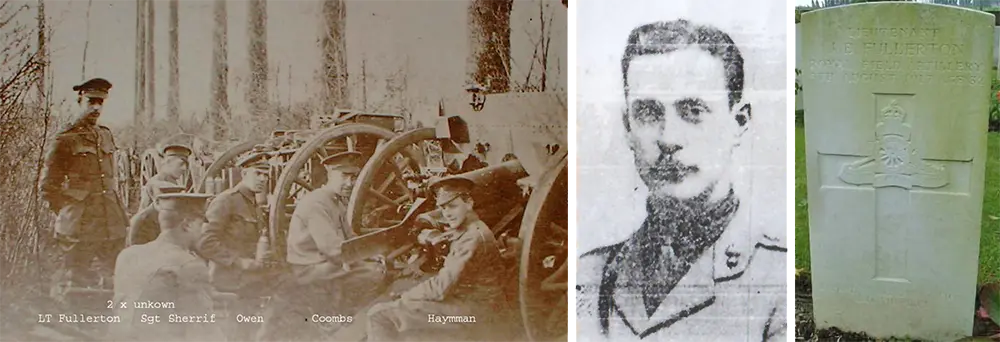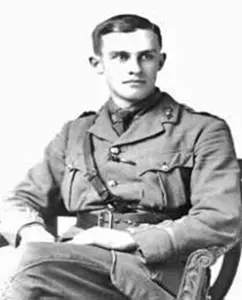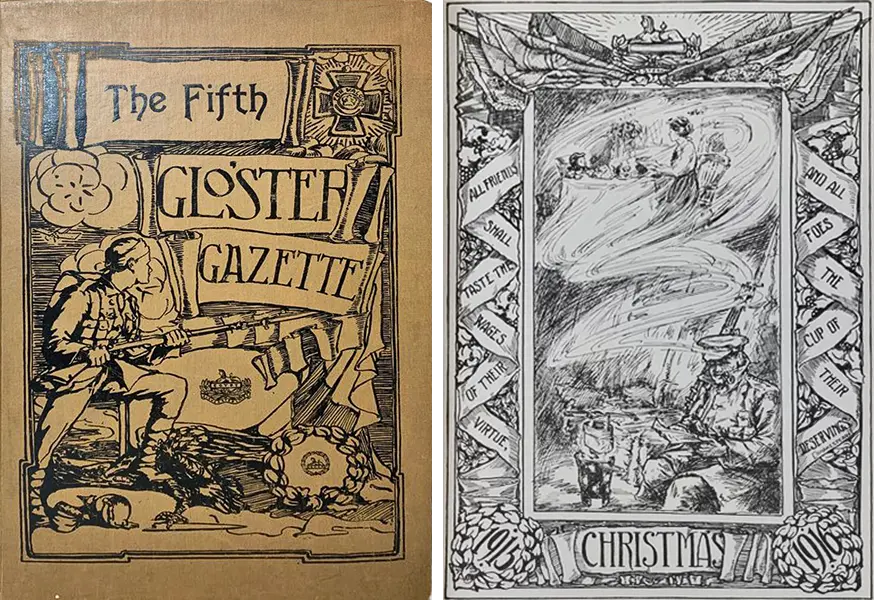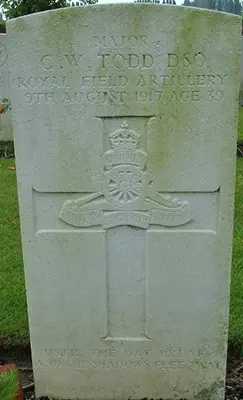WWI Obituaries - Lest We Forget
The number men killed by enemy action, died of wounds and sickness in the Great War will never really be known or in so many cases where they lie, but we are fortunate to have a list of officers and men who fell of the 1st South Midland Bde/240 Brigade R.F.A. (T)
This information on these pages has come from the Book of Remembrance kept in the officers' mess of 266 Bty (GVA) RA (V) and research from local papers and other sources supplied by Mr. Andy Stevens
We would be very grateful for any further information on members of the 1st South Midland Bde RFA/ 240th Bde RFA (TF) from 1908-1919.
Fullerton, James Basil - Lieutenant, A Bty 240th Bde RFA

Fullerton, James Basil - Lieutenant RFA
The first image is of D Sub, somewhere in Belgium
Lieutenant Fullerton was promoted from 2nd Lieutenant on 31st August 1914. On 31st March, 1915, the 1st. South Midland (Gloucestster) Bde. R.F.A. of which he was a member, left Abbeville, Somme, France for Hazebrouck, Nord and the war diary records that he and Lieutenant H. P. Lane were nearly left behind. Lt. E. L. Gedye RFA (T) gave greater detail in a letter to his mother:
Lane and Fullerton were nearly left behind here, as they had been left in charge of the train, while we went across to the Buvette, and only had a couple of minutes to get their refreshments. They naturally lingered over this, and had to sprint across several lines of railway, one platform and between two or three trains. However, they easily caught up our old tortoise, Lane sustaining a bruised knee as a result of a fall.
The diary of Capt F. S. Gedye M.C., explains Major Todd's death: "On August 9th, ''A' battery lost a fine soldier and splendid Commander in Major Chester Weston Todd D.S.O. and Lt. J. B. Fullerton both were killed by the same shell."
The son of D. L. & Jane R. Fullerton., of 4, The Glen, Clifton, Bristol, Lt. Fullerton died on 9th August 1917, aged 32. He is remembered in the Vlamertinghe Military Cemetery, Ypres, Belgium (VIII.D.10)
His obituary read:
Deep sympathy will be felt for Mr. and Mrs. D. L. Fullerton, of the Glen, Durdham Down, who have received the sad news that their elder son, Lieut J. Basil Fullerton, of the S. Midland Brigade., R.F.A., has been killed in action in France. The deceased officer was an old Redhillian, who after leaving school became associated with his father in business. Before the war he joined the R.F.A. as a gunner, and rose to the rank of Second Lieutenant. He mobilised in August, 1914 and had been on active service ever since. There will be widespread regret at the news of his death, for he was well known and very highly respected in the city. He was an office bearer and Sunday school teacher at Trinity Presbyterian Church and was noted for the earnestness in every work which he undertook. He will be remembered, too as a keen hockeyist who sometimes played for the county. The deceased officer was 32 years of age. Mr. and Mrs. Fullerton have another son serving with the Colours as a Captain in the Gloucesters, to which rank he attained at the age of 19.
Gedye, Edward Leonard - Lieutenant, 240th Bde. RFA
 Lieutenant Edward Leonard Gedye was a promising young officer with a large circle of Bristol friends. Born on 14 November 1892, he was the son of George Edward and Lillian Gedye, of 39, St Johns Road, Clifton, Bristol. He was educated at Queens College, Taunton, and joined the Gloucestershire Royal Field Artillery (Territorial) as a gunner in 1912. He was Gazetted Second Lieutenant on 7 February 1914, and to Lieutenant on 29 August, 1914, and when war broke out he was one of the first Territorials to volunteer for active service.
Lieutenant Edward Leonard Gedye was a promising young officer with a large circle of Bristol friends. Born on 14 November 1892, he was the son of George Edward and Lillian Gedye, of 39, St Johns Road, Clifton, Bristol. He was educated at Queens College, Taunton, and joined the Gloucestershire Royal Field Artillery (Territorial) as a gunner in 1912. He was Gazetted Second Lieutenant on 7 February 1914, and to Lieutenant on 29 August, 1914, and when war broke out he was one of the first Territorials to volunteer for active service.
In March 1915, as brigade orderly officer he went out with the British Expeditionary force, and in the autumn was promoted to the rank of first lieutenant. He was among those mentioned, by Sir John French in the November dispatches. Before the great advance commenced, he had been at his own request attached to his old battery in a territorial unit of the R.F.A. and was constantly in action from the beginning of July onwards. Then he was temporarily attached to another battery, and while so serving was killed while engaged on a dangerous piece of working in the hope of saving others on 23/24 August 1916, aged 23.
The story is told in a sympathetic letter written to Mr. G. E. Gedye, on 26 August, by the Major of the battery:
It is impossible for me to say how much I sympathise with you in your great grief.
Your son was attached to my battery when he met his death. A better officer I could not desire. He was always cheerful and intensely keen on his work; he was deservedly popular with all who knew him officers and men. He died in the most gallant attempt to save the lives of others, and he suffered no pain. His death is a great loss to the brigade, but we are proud of the way he died.
I do not know if you have already heard how your son was killed; in case you have not, I will tell you as nearly as I can. The evening before a bomb-store near by was hit by the enemy, and two explosions occurred. At about midnight on the 23rd your son was on duty at the battery and noticed a fire amongst a large pile of bombs and other ammunition. He called out to a gunner, 'Come on, we must put this out' and together they went up to it with buckets of water. The gunner was returning with an empty bucket and passed your son on his way up to the fire with a second bucket. A few seconds afterwards the explosion occurred. We buried him in the English military cemetery near by and we are having a cross-made to mark his grave.
It is not only in our own brigade that his loss is felt; officers from other units who came in contact with him all join in sorrow for his death. On my own behalf and on behalf of my battery I wish to express most heartfelt sympathy with you and Mrs. Gedye.
Twice mentioned in despatches, the deceased officer, whose career was cut short in the performance of a gallant act, was a keen cricketer, and used to be a member of Westbury Cricket Club.
Lt. Gedye was also a contributor to "The Fifth Gloster Gazette," a trench newspaper, writing under the pseudonym of "Emma Kew." There were 25 issues of it from April 1915 to January 1919. In October 1916, "The Times Literary Supplement" called it "the oldest and most literary of the British trench journals." and it was published in book form by A. Sutton in 1993. A reference to it also appears in the book "Tommy: The British Soldier on the Western Front" by Richard Holmes.

Fifth Gloster Gazette
For Sale: We have a few well seasoned rats in stock. Large variety of colourings and tail lengths. Any tail length from 2 to 6 inches. No reasonable offered refused:- Apply Quarter Master's Stores
Wanted: A serviceable pair of pedigree webbed feet. Size 10.5. Must be in good condition. State price and references:- X. Dugout 473
From "The Fifth Gloucester Gazette," 1993 Page 117:
OBITUARY
Many a time have our readers laughed heartily at the poems above the signature of "Emma Kew."
The author of such jolly verses as those entitled "Our Fighting Men," "Once Bitten" and "Emma Kew"
(Lieutenant Gedye, of the Gloucester R.F.A.) is dead, killed in a most gallant attempt to put out the fire which was about to ignite a "Dump" of Bombs.
We should like to express our sympathy with the Brigade of Artillery of which he was Orderly Officer, on their severe loss.
Lt. Gedye is rememered in Aveluy Communal Cemetery, Somme, France (G.46).
Sherriff, Bernard Henry - Sergeant, 825064, 240th Bde. RFA

Sherriff, Bernard Henry - Sergeant, 825064, 240th Bde. RFA
The first image is of D Sub, somewhere in Belgium
Sgt. Sherriff, 825064, was born in Bristol in 1893 to Edgar and Bertha Sherriff. He was promoted to Bombardier on 1st April 1911, to Corporal on 1st April 1912, and to Sergeant on 1st April 1914. He was married to Dorothy Edey Mary (nee Thickbroom) and lived at 18, Abbotsford Road, Redland, Bristol. Mentioned in Despatches in May 1917, he died of War Related Sickness and Pneumonia on 28th September 1917, aged 25, and buried in Canford Cemetery (C.26)
Sgt. Sherriff was first cousin of R. C. Sherriff, author of Journey's End, screenwriter for Mrs Miniver, Goodby Mr Chips, The Dambusters, and many more
Stone, Arthur Edward - Captain, A Bty 243rd (1st/4th South Midland) Bde RFA
Captain Stone was born in 1878 to Thomas Edward & Ellen and died on 24 Jul, 1916, aged 38, and was the son of the late Thomas Edward & Ellen Stone, of Bristol. He is remembered in Aveluy Communal Cemetery, Somme, France (H.40).
Captain Stone was the longest serving Bristol Gunner to die in the First World War. Arthur Stone had been a Bristol Gunner since 1896, he had volunteered for service in the Boer Wars. He was promoted to Bombardier on 1 April 1909, to 2nd Lieutenant on 11 May 1912, and to Lieutenant on 1 March, 1914 or 1 May 1914 (accounts vary).
As a Lieutenant, when 1st South Midland (Gloucestershire) Bde RFA was mobilized for war on 4 August 1914, he was placed in charge of the Advance Party consisting of of 11 NCOs and 4 men. Lieutenant Stone was promoted to Captain on 12 September 1914 or 24 October 1914 (accounts vary) and posted to 1st Battery.
Captain Stone was a popular officer. In his diary for Monday 24 July 1916, Lieutenant E. L. Gedye wrote:
We are all rather cut up this evening, Capt A. E. Stone was killed about 4o'clock while on duty at the O.P. the one we saw yesterday in Ovillers. I am awfully sorry. Old Stone was one of the very best and although he left the brigade some time ago now, when the new battery was formed, we shall miss him badly. He has a long record service, longer than anyone else out here with the brigade dating back to the old volunteer days. He has always been a very staunch upholder of our Volunteer and Territorial traditions.
A great thing in these days when the principal object of those set in authority over us seems to be to make us forget that we were ever anything else than the 240 Brigade RFA. I remember how frightfully sick he was when this new numbering was adopted. It was even worse for him than for us, because, being with a newly formed unit, he had not even the excuse that we gave for calling ourselves in defiance of all regulations 1st, 2nd or 3rd Gloucester Battery, instead of A & B or C/240. At mobilization, he was quite the keenest man for Foreign Service in the Brigade and it seems hard that he should be the first to fall. Still, I think he would have chosen to go the way he did, in a pukka show, on duty and on territory just captured from the Bosche.
From the Western Daily Press of 29 July 2016:
An official telegram was received in Bristol yesterday, announcing the death of Captain Arthur E. Stone, who was killed in action in France on the 24th inst.
Captain Stone was well known in the city from his connection with Messrs George White and Co., in whose office he had been for about 20 years. At the outbreak of the Boer War, in 1899, he volunteered with the North Somerset Imperial Yeomanry, and was one of those who formed the guard of honour when Lord Roberts entered Pretoria.
Captain Stone will be remembered as Sir George White's private secretary for many years. He possessed exceptional business quantities and was entrusted with very important business matters. He rendered valuable service at the time of the formation of the London United Tramways, and later when the business of the British and Colonial Aeroplane Company began to develop, he was selected to control the financial arrangements, and was actively engaged in that capacity up to the time of the outbreak of war
He was an old artilleryman, and had always a great interest in the Bristol Artillery Volunteers in which he served successively as gunner, Bombardier, Sergeant, and later obtained his commission. On the outbreak of war in August 1914, he was one of the most vigorous recruiting officers in the South Midland Royal Field Artillery, and was successful in obtaining a large number of recruits.
Shortly after his brigade left for France he was appointed Captain, and showed marked aptitude as an officer, so much so that he had recently been appointed to the command of a battery. His Brigadier General, in writing to his relatives, speaks of him "as a gallant officer and an excellent battery commander, in whom he placed the greatest confidence."
Captain Stone had the happy knack of making friends wherever he went, and was held in the highest esteem and affection by the members of the firm, as also by the whole staff at Clare Street House and at the Aeroplane Works at Filton, and his loss will be keenly felt by his many friends and the men of his battery.
Todd, Chester William - Major, DSO, A Bty 240th Bde RFA
 On 9th August 1917, Major Chester William Todd, DSO, a much loved and respected commander, was killed in action leading the Bristol Gunners during the Battle of Passchendaele.
On 9th August 1917, Major Chester William Todd, DSO, a much loved and respected commander, was killed in action leading the Bristol Gunners during the Battle of Passchendaele.
Chester William Todd was born to William Ansell (1846-1912) and Alice (nee Goffe) (1849-1919) Todd in September 1878, in Bristol.
On 17th January 1900, Chester William Todd, Gent, became Second Lieutenant Todd; on 22nd August, he was promoted to Lieutenant. He was promoted to Captain on 3rd December, 1902.
A liitle history. On the 31st of March 1908, the Volunteer Force ceased to exist as such and the Territorial Force was established by the Right Hon. R.B. Haldane, Minister for War. Under the new scheme, members were to be attested and enlisted for four years and the period for camp increased to 15 Days. The Territorial Force was organised in 14 divisions modelled on the lines of a division of the regular army. This Brigade became known as the 1st South Midland Brigade R.F.A. consisting of 1st, 2nd, and 3rd batteries and an Ammunition Column.
It was announced in the London Gazette of 21st March, 1913, that Captain Chester W. Todd had resigned but was granted permission to retain his rank and to wear the prescribed uniform. The world was changing and evetns were about to overtake everyone. On 28th June 2014, Archduke Francis Ferdinand was assassinated. On 28th July, Austria-Hungary declared war on Serbia, this was the start of World War I.
On 5th August 1914, Todd returned to the Brigade with his old rank of Captain. On 9th October 1914, Captain Todd was promoted to Major and placed in command of 1st Battery. On 9th December 1914, Majors Todd and W. H. Wise were sent on a course to obtain lines of fire from an aircraft at Widford, Essex. Several officers were sent to the front lines in France, they returned on 10th March 1915, and the next day, Todd lectured other officers on the conditions they found.
On 29th March 1915, the Division embarked on SS The City of Luchnow and SS Huanchaco and next day were at Le Havre, in France. By 1916, Major Todd was Battery Commander (BC) of A Battery, 240 Brigade RFA(V).
The London Gazette of 24 November 1916, announced that Major Todd had been awarded the Distinguished Service Order (DSO), "For conspicuous gallantry in action. He handled his battery with the greatest courage and initiative throughout the operations, he carried out the most careful observations, enabling him to bring to bring accurate fire to bear in support of the infantry." This was the first time a Battery Officer of the Brigade had earned the DSO.
Major Todd had been in hospital for some months suffering from Trench Fever causd by the conditions the men had to endure. In April 1917, Major R McLeod (MacLeod?) took over Todd's duties as BC to A Bty.
The diary of Capt F. S. Gedye M.C., explains Major Todd's death: "On August 9th, 'A' battery lost a fine soldier and splendid Commander in Major Chester Weston Todd D.S.O. and Lt. J. B. Fullerton both were killed by the same shell."
Major Todd who was 39 when he died, left behind a widow, Margaret Mary Phillips (1877 - 1962) and three children, Marjorie (1904 - 1985), Gerald William (b. 1908), and Cyril Chester (1909 - 1989), who lived at 21, Downleaze, Stoke Bishop, Bristol.
The Western Daily Press of 15th August 1917, reported that:
Well known Officers Falls in Action
It is with much regret we record the death in action on the 9th inst., of Major Chester W. Todd R.F.A.
Major Todd was the second son of the late Mr. W.A. Todd J.P. and of Mrs. Todd, of 4, Clifton Hill, Clifton . He was a member of the Gloucestershire Artillery since 1896, and retired with the rank of Captain in 1912. On the outbreak of war he rejoined his regiment, and was afterwards appointed temporary Major of No,1 Battery RFA, since the spring of 1915 he had been in France, but was home recently to recuperate after an attack of trench fever, and only returned to the front some four weeks ago, when he was again given command of his old battery, and received a hearty welcome from his men. He was twice mentioned in dispatches and awarded the D.S.O. in September 1916, for gallantry in action, and having handled his battery with courage and initiative. Major Todd was a director of Messrs Todd and Co., Ltd, wholesale clothiers, Temple Gate, Bristol, and was a member of the Society of Merchant Venturers.
He resided at Russell House, Portishead, and was well known in the neighbourhood, having taken a great interest in local matters and was for some time treasurer to the Portishead Church Council. He leaves a widow and three children to whom the sincere sympathy of citizens generally will go out.
Major Todd's sword, the blade engraved with "1st GVA", is a cherished possession of the Battery. Major Todd is remembered at the Vlamertinghe Military Cemetery, Ypres, Belgium.
Sources and Resources
Header image: Tyne Cot Military Cemetery (Pixabay) - Photo by Elsemargriet
Derek Driscoll's original pages
1st South Midland /240th Brigade RFA War Graves
240 Bde RFA [T] list of known dead (Other Ranks)
240 Bde RFA [T] list of known dead (Other Ranks - Next of Kin)
Graves of the Fallen
Lest we Forget
Obituaries
Officers Next Of Kin Deaths
Officers Of 240 Bde RFA [T] Deaths
Sources of information
War Graves
Was it all worth it?
Derek Driscoll's references
241 Brigade Royal Field Artillery
Book of remembrance held by 266 Bty, GVA, RA(V), Bristol
Mr. Andy Stevens
Royal Artillery Firepower Museum
Soldiers who died in the great war
The 48th (South Midland) Division in 1914-1918
The London Gazette
Other References
Commonwealth War Graves Commission
Find a Grave
Imperial War Museums - A wealth of information espcially as more of the collactions are being put online
Naval & Military Press
Royal Artillery Association
Royal Artillery Museum
The Long Long Trail - Reference site about the British Army in the Great War
War Graves on the 1914-1918 Western Front
WWI Cemeteries
WWII Cemeteries
